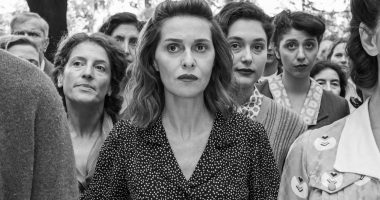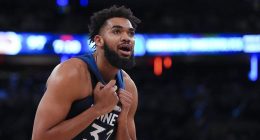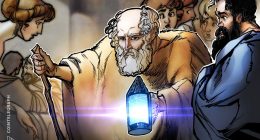[This story contains spoilers from the first five episodes of Love & Death.]
There’s a method to the madness of Love & Death‘s release.
After three episodes of spending time in the bucolic and beautiful setting of Candy Montgomery’s (Elizabeth Olsen) church community in Wylie Texas, the fourth episode of the true-crime Max series shattered that image when it arrived at the shocking event viewers knew was coming: The killing of her friend and neighbor, Betty Gore (Lily Rabe).
The first three episodes, directed by executive producer Lesli Linka Glatter, released at once in a bid to set the scene around the infamous real-life killing of Betty, the Texas housewife who was struck by an ax 41 times by her friend, Candy, in 1980. The murder went to trial — as will be shown in the remaining episodes of the limited series from David E. Kelley. And though Candy was ultimately acquitted, there was never a question about who was wielding the ax. As her attorney Don Crowder (Tom Pelphrey) tells her at one point: Candy can be found not guilty, but she’s not innocent.
The fourth and fifth episodes delve into that sentiment by showing pieces of Betty’s gruesome death from the perspective of Candy, sourced from Candy’s testimony during the trial. The fourth episode, titled “Do No Evil,” shows Candy being attacked by Betty and then cuts to follow Candy in the days after the shocking event, as she attempts to will the killing into nonexistence. She takes a shower in Betty’s house, hides her wounds and then drives to the church where their children were in school to bring Betty’s daughter home for a playdate. When Betty’s husband, Allan Gore (Jesse Plemons), calls Candy from his business trip concerned over Betty not answering the phone, Candy even offers to go over to the house to check on Betty and their infant daughter.
Candy lies at first when questioned by police, but Allan separately confesses to them about their affair. And in episode five “The Arrest,” Candy quickly becomes the prime suspect, is arrested and charged with murder and begins to build her self-defense case. Privately, she confesses what happened to her attorney while publicly, and with her family and closest friends, she puts on a face of denial. But then, during a visit to a psychiatrist for a hypnosis treatment, the facade begins to shatter. The session, full of moaning and screaming, unearths a triggering childhood trauma, and Candy and her lawyer begin to piece together how this all could have happened: She’s not a sociopath; she just snapped.
Now heading into the trial portion of the limited series, The Hollywood Reporter speaks with Olsen about what drew her to playing Candy in the TV retelling, where she lands on some of the lingering questions and how the experience in this role has impacted her Marvel aspirations.
Love & Death creator David E. Kelley and director Lesli Linka Glatter have said they wanted to revisit this true-crime story to dig deeper and explore the “how” of what happened. Can you share some of those conversations? And is that what attracted you to playing Candy?
The main thing that attracted me was that I felt like the character was so fun without even having the twist. I haven’t felt like I’ve played very effeminate characters, and it was something in myself that I wanted to explore a bit. I feel like I present very tough. I trained my body ever since I was a child to be more masculine, because that’s how you’re taken seriously; then people can think of me as smart, or whatever. You learn as a child. I really wanted to connect to a more feminine version of myself, and I had already known that. So when I was reading that script, it felt like this was an opportunity. And then tonally, there was something very exciting to me. I love, love, love playing characters that make decisions that don’t make any sense to me or where I don’t quite understand how their decision-making led to that. When I talked to David and Lesli, there were really specific tonal references that excited me and it seemed really aligned with how I was reading the script. Then it was after I said yes that I said, “Oh shoot, this really happened.”
That conflict is present. Watching the first three episodes, Candy is relatable and her discontent is understandable; she’s bored and has an affair. Was that part fun to play?
Yes. I think it’s also really necessary to see how much she focuses on this external representation of herself in the community, and how she needs people to like her and how she wants to be the woman who can do it all. Because when the event of the murder happens, all of those foundational elements of what made her her are being challenged. And she’s trying to hold onto it. Episodes four and five have their own kind of world, where I think she’s trying desperately to hold onto the thing that she built. And then it goes into the trial. So I felt like it was important for that lovable foundation to be set, because that’s the thing that’s at risk of being lost.

The fourth and fifth episodes start to show Candy’s version of Betty Gore’s death, based on what Candy said at the trial, but focus on Candy’s behavior after the event. What were the discussions about how much you wanted to show at this point about the actual killing?
When we filmed the sequence of the actual murder, we knew that we were going to share information at certain times. And so we just filmed it for literally what she says in the trial. And also, what she kind of explains bits of in the hypnosis. We don’t want to let Candy off the hook. While filming, I had to be very much, in my mind, that this is what she at least convinces herself. Things don’t have to happen the way they happen, but people eventually convince themselves of a truth. And I think regardless, that’s maybe what she convinced herself of.
But Lily and I talked about this ax, really. Anyone who I spend a lot of time with, when I go over to their house all of the time, I wouldn’t know what tools they have in their garage. And technically, that’s where Allan [Gore, Betty’s husband] says they keep their ax. And so, who presents the ax? That step should not allow for anything else that happened after that to have happened, but it’s just me trying to understand a woman.
So, who did you think pulled the ax first?
I can’t imagine someone going into someone else’s garage and knowing where to grab a tool. Any kind of tool: a hammer, an ax. But then there were [Candy’s] sunglasses that were in the garage [also an element of the trial]. There were elements that really don’t make sense, and I don’t even know if she even knows the truth anymore.
What was it like filming the murder scene with your co-star Lily Rabe?
Lily was six months pregnant. It was awful. She had a double. And they also could erase [her belly] in post. But she was in a little shirt with a six-month belly! It was crazy. And she really wanted to do everything. Lily is a really physically strong human being, and so it was like real tension, physically, and there was an element where I felt safe because we had choreography, but there was an element where I didn’t want to do everything. So it was a lot of things.
That sounds a little more Method than I was expecting you to say.
Yes! (Laughs.) My experience with more fight sequences isn’t hand-to-hand fighting. And so it felt kind of scary at times. And then there were moments where Lily asked me to, with the rubber ax, make contact with her body. And I tapped out and was like, “You’re going to have to do this with my stunt double.”

Love & Death uses as its sources the book Evidence of Love: A True Story of Passion and Death in the Suburbs and the two-part Texas Monthly article “Love and Death in Silicon Prairie.” What did you know about the Candy-Betty story going in. How much prep did you do to play her?
I wanted to know everything. With also the knowledge that Lesli didn’t want us to try and look exactly like these people. I think it’s really nice when you have a pre-existing book, if it’s fictional or not. I loved having this book Evidence of Love. There are so many details in Candy’s childhood, in what she read during this time, books that she loves and letters that she wrote to her husband when they were courting each other. There’s just so much of the way her mind works that I found helpful. Also, we don’t have recordings of these people, so you kind of get to piece together that she was a bit of an army brat but lived in Texas for about 10 years. So, how does someone present their speaking voice with all that knowledge? So, all of that was so helpful. Then I started to play with the character’s voice, and I had a real understanding, because of the text, of her relationship with all these people, and then you kind of forget about it and focus on the scripts that you have and trust that it’s in your body. But I love having information because I’m not that good at inventing stuff that’s not on the page.
You’ve been in some pretty inventive projects!
(Laughs.) But I really enjoy having all these anecdotes. Like, this was her relationship to boys when she was 12, and there’s a story behind it. That’s something where I maybe now understand why actors do that kind of stuff before playing a character because it informs something, at least in the development of the choices you make of externals in some way.
One of Candy’s trial attorneys, Robert Udashen, served as an advisor on the series. What questions did you have for him specifically?
Yes. It sounds like he’s involved with every telling of this story. He was around and on set while we were working. Part of me, I didn’t really care that much. Because at that point, we had been filming for six months so I’ve already made these choices — I can’t go backwards now. I think I asked about how sedated she had seemed [during the trail]. She was definitely very sedated on medication when they were on trial.
You said you did not reach out to Candy when making this series, a decision you made to respect her privacy. If there was one question you could ask her, have you thought about what it would be?
No, I haven’t… (thinking) I think I would ask her if she was actually hypnotized or if she was controlling that experience. Even meeting with the hypnotherapist and doing a session with them, I’m just like, there’s no way this controlling woman was able to fall under hypnosis.

When you were filming, was Hulu’s Candy in the ether and was it anything you paid attention to?
We wrapped a year ago, in April. And we started the September before. I wasn’t paying attention to it, but they did start filming after us and finished before us. And then we wrapped. And then their show came out. It was all very fast! I think the trailer came out, even, when we were still shooting, which is so crazy because they really turned that around quickly. But I think it would be an interesting exercise as an audience member if you’ve seen that to also see ours, or vice versa. Just because it’s not about one person owns a story, it’s about how different people come together and tell a tale or tell a version of a story, and how many ways there are to tell a story I find endlessly fascinating, which is why you return to the theater and the same plays all the time. To me it’s not an us vs. them. It’s more like, how does that inform this version of this story?
How do you feel about the verdict after going through this process, and how do you feel about Candy today?
So, the verdict is what it is. I don’t know. It’s hard to actually form an opinion about that. There’s something Lily and I talked about, because Lily has played some characters who have done questionable things. It was like month four or something of working, so we were deep in it, we still had a lot more time to go. And I think Lily was just like, “How are you? How are you doing? Are you tired?” And I said, “Yeah, but the thing that gets me through this job is she’s such an optimist. And presents so positively.” It was something that gave me energy. I couldn’t really just be a mumblecore, depressed kind of person. She was manically doing, doing, doing. And so it gave me energy playing her, and so I kind of admired that persistence. So that’s, I guess, how I feel about her. I don’t really know anything about what really happened, except for our show, but I loved playing a character that led with positive persistence.
Love & Death is more of a character study. How did this role and experience impact your interest in continuing to play in the Marvel world, and what are you looking to tackle next?
It’s almost like WandaVision informed a process for me that I had been missing. I had been missing something physical, and it was such a physical job. So it felt like I tuned something up, that I wouldn’t have really been able to fully create the character for this show had I not had that workout with WandaVision. This is so silly, and I’ve said this to Jesse [Plemons], that I every time an acting job ends, I feel like I need to go back and work on my free throws. And he was like, “What’s a free throw in acting?” And there are just certain things that you learn of what starts to feel really good and how can you figure out how to get to that space of freedom and understand: Well when do I not feel free and why? So there are certain things that I now want to work on moving forward that’s really specific technical stuff.
But I’ve got nothing going on right now, because I’m so picky! I don’t want to work for work’s sake. I really love playing fun characters. I think what I’m focusing on right now are just directors whose visions I love, even if they’ve never done a narrative feature. That’s what I’m really hoping to figure out. I think right now, as you well know, it’s a really odd time to try and make some stuff because of the state of the industry. So I’m really hoping that some things come together that I’m excited about. But it’s a bit of a challenge right now.
This interview was conducted before the May 2 writers strike and has been edited for length and clarity.
New episodes of Love & Death stream Thursdays on Max.
Source: Hollywood







